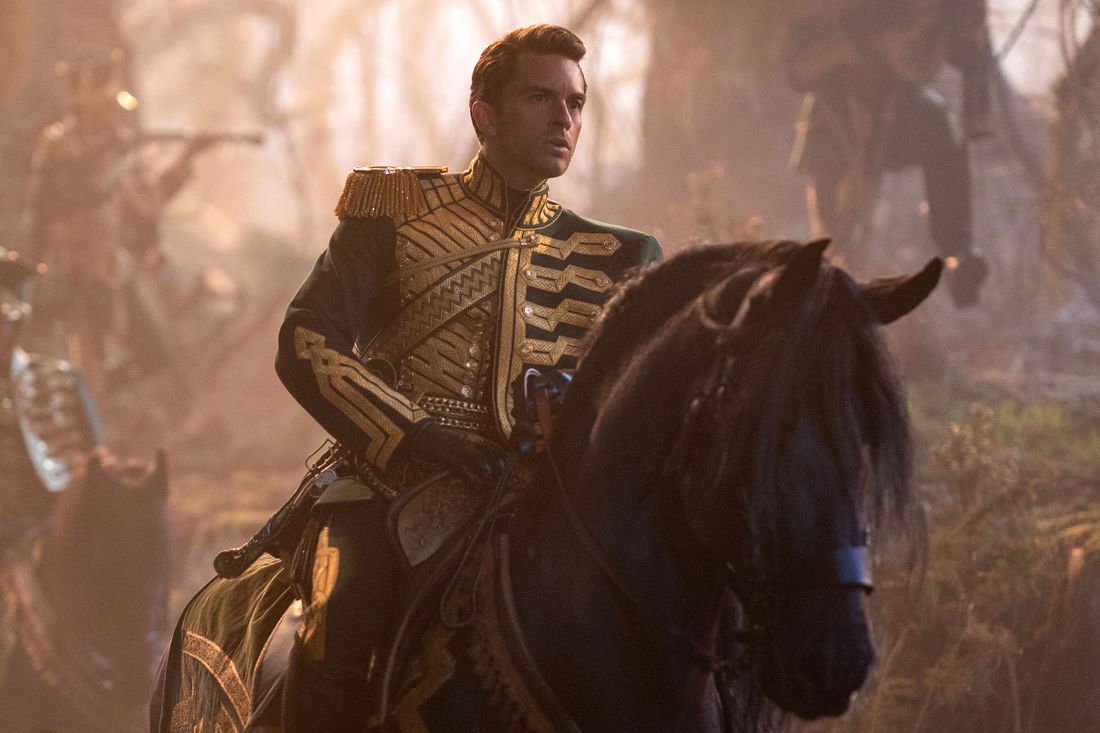
Spoilers for Wicked, the 20-plus-year-old Broadway musical, as well as Wicked: For Good, ahead.
Are you a fan of Jonathan Bailey? If so, seeing Wicked: For Good might turn you into a devoted follower. This new film is the second part of the Wicked musical adaptation, and its story runs alongside the events of The Wizard of Oz. However, Wicked: For Good also features a surprisingly intense and visually striking romantic storyline reminiscent of The Passion of the Christ.
When Wicked premiered in 2003, the idea of telling a story from the villain’s perspective was fresh and exciting – it wasn’t the common trope it is today. Seeing the Wicked Witch of the West and Glinda the Good Witch as friends, with a hint of romantic tension, was truly innovative. Stephen Schwartz’s lyrics cleverly hint at the characters’ future fates through playful language and subtle references, especially regarding Fiyero. Elphaba’s introductory song, similar to those found in Disney films, is filled with hopeful lyrics that take on a tragic meaning when you know how the story ends – lines like “a celebration throughout Oz that’s all to do with me,” or “so happy I could melt” are perfect examples. This creates a delightful irony, relying on the audience’s existing knowledge of The Wizard of Oz. However, of all the origin stories within Wicked, Fiyero’s stands out as the most surprisingly profound – it unexpectedly evolves into a story with parallels to the life of Christ.
If you’re unfamiliar with the story or haven’t figured it out yet (despite some hints in the advertising): the charming prince, Fiyero, ultimately becomes the Scarecrow in Wicked. The show subtly prepares you for this twist by portraying Fiyero as a bit of a clueless heartthrob, even including a song about him being “brainless.” This is further hinted at in the movie adaptation with some awkward, floppy dance moves during the song “Dancing Through Life.” The way this transformation actually happens is revealed throughout Wicked in a surprising and unexpected way, almost like a strange religious story set in Oz.
The turning point happens when Fiyero, having matured and become more ethical, makes the ultimate sacrifice for Elphaba’s life. Though his method isn’t noble – he briefly holds Glinda hostage to force the Ozian guards to release Elphaba – the result is the same. He allows himself to be arrested and taken away, and then endures horrific torture, ultimately being crucified and left to die. The extent of his suffering is powerfully illustrated in Elphaba’s song, “No Good Deed,” where she desperately attempts to save him with magic, pleading that he not be torn, stained with blood, feel pain, or have his bones broken, and that he somehow survive despite their efforts to destroy him.
If her spell worked, the dramatic events would culminate there, with Fiyero enduring intense suffering as a result of his sacrifice (apologies for mentioning that!). Thankfully, for the sake of my theory, we know Fiyero does suffer greatly before he’s resurrected. The movie shows him being brutally beaten by the guards until he appears to be on the verge of death, coinciding with Elphaba’s spell. When she sings, “Since I cannot succeed, Fiyero, saving you,” we see him again, looking lifeless and resembling a Christ figure on the cross.
A piece of Fiyero’s jacket becomes a treasured relic, treated with the same reverence as the Shroud of Turin. Glinda interprets it as proof of his death, believing he sacrificed himself for Elphaba’s actions. However, near the end of the film, Fiyero unexpectedly returns, emerging as an immortal scarecrow with a golden halo of wheat. His body has been transformed into straw – essentially dried wheat, which is closely related to bread. This transformation is strikingly similar to the religious concept of transubstantiation. The main difference between Fiyero’s story and that of Jesus, the author playfully notes, is that Fiyero’s lover takes on the role of God the Father. And, arguably, Fiyero is a bit of an improvement over the traditional story, being somewhat clueless – which the author considers a positive change!
It’s possible the religious undertones in Wicked aren’t accidental. The novel’s author, Gregory Maguire, is a gay, practicing Catholic. And the composer, Stephen Schwartz, famously started his career with Godspell, a musical about Jesus – much like Schwartz, I’m Jewish and have always been intrigued by, but not strictly bound by, religious themes. Whether these parallels were deliberate or just happened naturally, I appreciate Jonathan Bailey’s portrayal of a lovable, almost god-like Scarecrow.
Read More
- YouTuber streams himself 24/7 in total isolation for an entire year
- Gold Rate Forecast
- Shameless is a Massive Streaming Hit 15 Years Later
- ‘That’s A Very Bad Idea.’ One Way Chris Rock Helped SNL’s Marcello Hernández Before He Filmed His Netflix Special
- Decoding Infant Cries: A New Approach to Understanding Baby’s Signals
- Lacari banned on Twitch & Kick after accidentally showing explicit files on notepad
- We Need to Talk About Will
- A Duet of Heated Rivalry Bits Won Late Night This Week
- XDC PREDICTION. XDC cryptocurrency
- Binance Wallet Dives into Perpetual Futures via Aster-Is This the Future? 🤯
2025-11-19 22:56